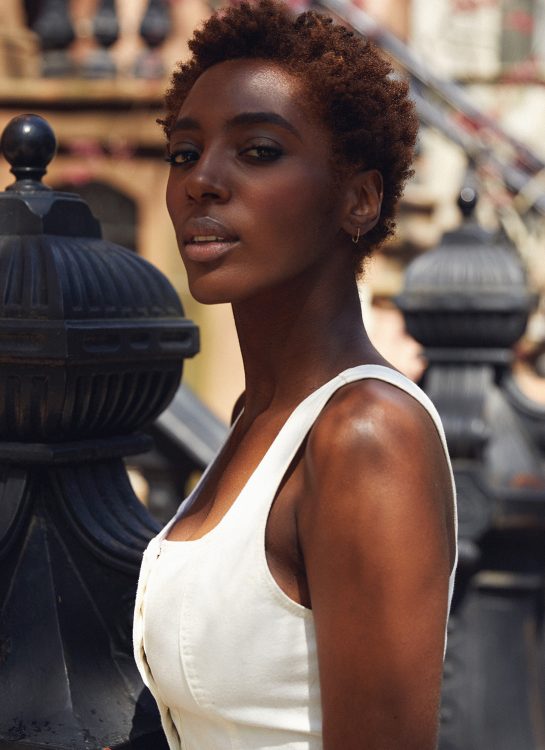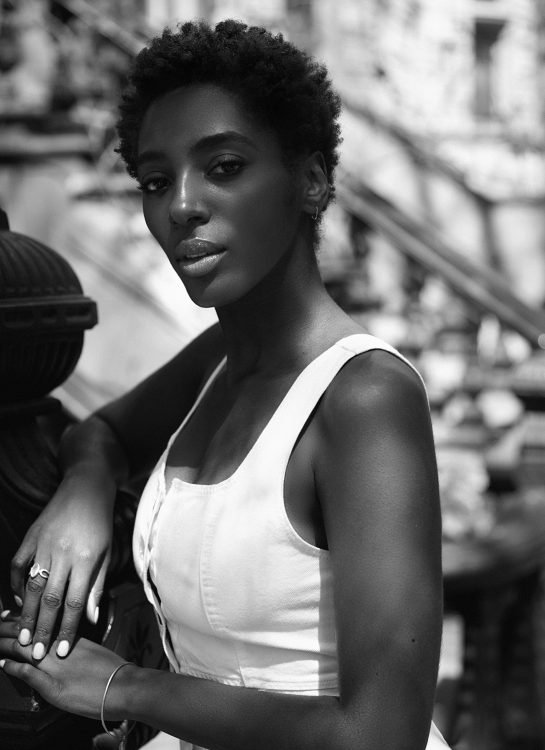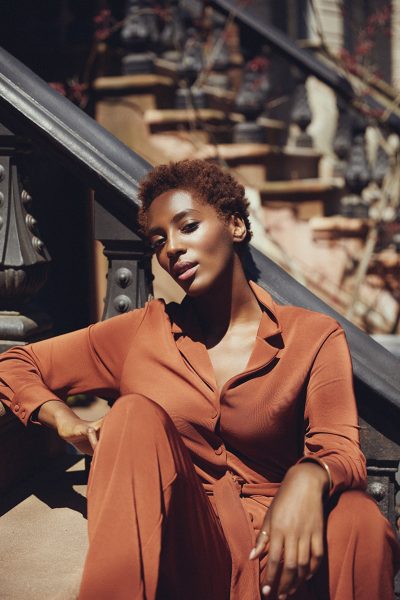- Words Cal McIntyre
- Photography by Andres De Lara
After interviewing Koffee for Notion 84, we sit down with the acclaimed poet of 'Bone' and author of 'The Terrible' to talk the gruelling work of crafting words that pull your soul up from within you.
Sometimes there are words that look at you rosy-cheeked and soft from the page. Sometimes there are words that grab you and force you to look at them through your heart. Yrsa Daley-Ward knows of these words as she crafts and moulds them together as if she was speaking to you and only you from the page.
If you’re not yet aware of Yrsa’s incredibly honest and raw works you will have definitely seen her prose making the runs online. Don’t get it twisted – Yrsa cannot be confined to the newly dubbed ‘InstaPoet’ box – not to say that that’s a bad thing. It’s Yrsa’s brutal yet remarkably empathetic works that have shot this artist into her own playing field.
From self-publishing ‘Bone’ in 2014 after the encouragement from her fellow tribe of writers, in particular, Nayyirah Waheed, Yrsa Daley-Ward of West Indian and West African heritage, began to feel the momentum garner behind her work. More and more people were resharing Yrsa’s work as if they were notes from their own heart. From incredibly soft and tender poems such as “Seize that loveliness. It has always been yours” to the starkness of “If you were married to yourself could you stay with yourself? My house would be frightening and wild.” Yrsa’s ‘Bone’ is only a peek behind the curtain with themes of sexuality, love, loss, heartbreak, death, racism and mental health packed into a few carefully curated lines. ‘The Terrible’ however, a “dreaded” memoir, by Yrsa throws you into the deep ocean as she takes you by the hand, sometimes against your will, through her life so far. Yrsa never exactly lets you know what The Terrible is – but everyone has one, sometimes following behind you and sometimes it is you.
Tackling hardships through her childhood upbringing as a strict Seventh Day Adventist, to her sexuality, self-destructiveness in a world of drugs, alcohol, sex work, heartbreak and growing up black in the North of England. Yrsa’s ‘The Terrible’ is something that you can’t look away from, but the power of Yrsa is that her craftmanship reaches out to you as if a friend was telling you these memories. Armed with stanzas, powerful hands and energy that brings in you for a warm and gentle hug is something close to magic that Yrsa radiates.
An artist of the truest sense, Yrsa’s talents spread far and wide into many mediums. Diving into acting with an upcoming BBC drama, we sit down the awe-inspiring Yrsa Daley Ward as our latest Internet Crush!
Hi Yrsa, I’m so happy to be speaking with you. I know you released Bone independently in 2014 and then Penguin re-released it in 2017, what has the transition been like from then to now?
It’s interesting because I released that book as an independent writer and I’ve had some things out traditionally and often with publishers it’s not the right time or your work is just not what they’re looking for. So I had no expectations, I just wanted to release some work into the world without too much of an expectation. It happened so slowly from 2014 to 2017, I was just happy to have the words out there and a small community appreciating it online, and then it really started to pick up.
I started to really enjoy doing independent gigs and being someone who’s self-motivated, it was fun and it felt organic. It was a big step when [Penguin] came to me and they didn’t come to be asking directly about Bone. They’d seen the success of it and they wanted to re-release it officially under the brand but they asked if I had anything else in the works. I said yes, which was not true [laughs] but I thought you know you can do it, you know this thing is within you. I’d always rather overestimate what I can do than underestimate. You’d be surprised what happens when you give yourself that kind of challenge, it’s almost like I back myself into a corner, that pressure is really good for me. There’s no time for self-sabotage or procrastination with that fire under you.
It’s the art of overestimating yourself, I’ve never thought about it that way before.
It’s a bit of trickery in the brain. It’s not that I know I can definitely do it, but it’s a trick I play with my mind because I know when I doubt myself it is not my friend. I could so easily stay in bed all day, that’s why I do these things, so I can jump up to whatever I’ve set myself to do. Even if you don’t quite do the thing, it’s still more than you would’ve done if you played it safe, and you’d be amazed what you can find in yourself when you’re really up against it.


People have often called you an ‘InstaPoet’ in the past, have you noticed a shift from ‘Bone’ to ‘The Terrible’ in how people write about you?
I still get called an Instagram poet, you have to just laugh because I think if you take an excerpt or a few lines from an article it can get in your head. Everyone wants to call me that because that’s the new thing. I think any creative expression is positive and valid, but then some people just write a few lines without much thought and call it poetry, it’s a tough one because who is to say what’s poetry and what isn’t.
That’s what I’ve noticed following you on Instagram, you always put up the progression of your poems from the first unfiltered product to the final message – you can really see the craft of it all.
Thank you – I think it’s not just about putting a shiny finished image up, it’s also about the process and the mistakes that go into it.
The terrible has gotten amazing reviews. It was refreshing to see how you shared your mistakes in a relatable and honest way. Was it difficult or was there a sense of release to get that all out onto paper?
When you’re there discussing alcohol and drugs and sex work, it’s going to be controversial. But at the end of the day, I feel the passing of time very strongly and I don’t have time to worry about that stuff because people are going to judge regardless. There’s a fearlessness when you choose to write about stuff like that and really look at it and you realise that you’re not afraid of anything anymore. Even in other areas like acting, you bring your whole self because there’s not a part of you that you’re trying to hide and in the end I feel like it’s worth it, you know.
We make our own chains worrying about that stuff, what really matters is who you’re loving, if you’re loving them well, are you looking after yourself, are you being responsible?
Do you have any rituals you do before you sit down to write?
Often at the beginning or the end of the day, I’ll have a moment. It’s always kind of sleepy and dark and serene and I’ll always get up and write it down quickly. I’ll grab some water and my little snacks and just start writing. I just let it come and it’s usually in the morning when I’ve been dreaming but recently I’ve been working quite late in the night and then sleeping in. I use the moment and really take it all in, writing isn’t supposed to be a chore but a time that you enjoy.

What’s it like being on the other side of the world in this other chapter of your life?
It’s really nice – the energy in New York is something else. I was filming up in Manchester and after a couple of weeks it feels normal. I come to London and it feels normal, I feel like my culture is inside me. There are visible places that are familiar to me but if travelling alone and being alone is very liberating as well.
What are some of your life mantras if you have any?
“Goodness for goodness sake”, if you don’t like what is happening use your power to shoot yourself out of it. Search for the things that you want which fuel your passions because they’re over in the blink of the eye. All we really have is now and when you feel like you don’t like where you’re at, don’t hold onto it. Of course, it’s dependent on looking back, if it works it works and if it doesn’t it still works, it’s all movement.
Even if it’s just how you live your life or you’re in a situation that’s difficult and takes longer to get out of than anticipated, you’ll find your break out and your happiness. Take responsibility for your spirit and emotional state.
Your energy as a person is contagious, there’s so much hope and genuine positivity. Obviously, you’ve been through so much but there’s this aura about you, an understanding heart, how do you keep that in your mind in difficult situations?
I think by tuning into what you really love and your passion because that’s a decision it’s not like you wake up every day and it’s working perfectly it’s a decision to go ‘ok, this is how I’m going to perceive this’.
You know there’s a barrage of bad news, of politics, we’re all connected to what’s happening, so you’ve got to arm yourself with a sense of how to offset these things. For some people it’s running, I meditate. Identify what those things are, even if you need to sit under a tree one day a week, whatever fills you up. Look after yourself from the inside out, before you do anything else you’ve got to have that base, being empathetic and feeling things.
After a while it becomes the easier thing to do, just listening to my breath, water, sitting in the park, clearing my mind and my heartbeat. Revolving around that a couple of times a day helps get rid of everything because so much of what clogs up your brain is waste, so you just need to disconnect from your body. It’s important to just take your time with it because if you don’t have that, you’re not going to have time for the other things you need. Just some silence and to appreciate the little things you have around you. I have to do those things in order to do the other things.
I think with anxiety and conflict you have to embrace it too because life’s going to have its adventures, without it life would be boring and we wouldn’t have amazing books and art.
How would you describe love?
Surprising. Constantly being surprised by my own capacity and other people’s capacity to love, it’s a mystery, but I love it, that’s why we’re here, the one reason.

